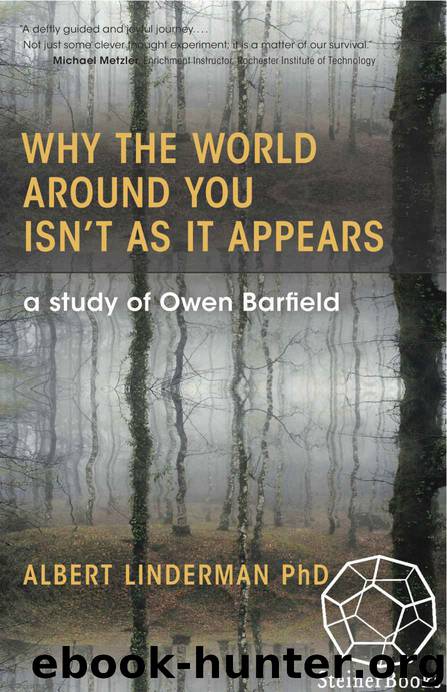Why the World around You Isn't as It Appears by Albert Linderman

Author:Albert Linderman [Linderman, Albert]
Language: eng
Format: epub
ISBN: 9781584201229
Publisher: Lindisfarne Books
Published: 2012-08-31T21:00:00+00:00
The Birth of “Me.” Simply being aware of and perceiving the mockingbird sounds is only one part of reality as we know it—the part divorced from individualistic analysis or logical deconstruction (i.e., what non-Enlightenment thinkers may perceive). The other part of reality that gives these sounds meaning occurs within you when you think about the perceptions. As you work to figure out the four bird sounds, you are the self-aware subject trying to determine whether there is either one bird or more than one. The unseen detective aiding you in solving the mockingbird mystery is your mind's thought processes. The ability for the average person to invoke these mental images and constructions is a result of Enlightenment evolution.
Take a moment to remember what was stated earlier: You exist as an object to yourself. You are able to “watch” yourself in your mind. Sometimes you likely surprise yourself with what you do, say or think. In a real way, “you” exist as an individual because of thinking. Were you not aware of yourself as a subject in your own mind, you would not consciously know there is a “you.” You exist as both a subject and an object: a subject when you think of something other than yourself, and an object when you think about yourself. You, as a living breathing human individual, are living within the reality woven by thinking.
Some may object to the view that each experience must be driven by using thought constructs at all times. These people contend that thoughts are “stored” in your brain, much like bytes in a computer's circuits, and therefore there is no need to use thinking constructs in order to access this information. However, thoughts do not stay in your brain. Your brain is a physical organ, but it does not store perceptions and thought like a computer hard drive. Despite the many efforts of science to locate color, sound, an idea, or a memory in the physical brain, none has been located. Scientists conclude that one cannot say where the sound (or color or idea) resides. These experiences reside in our mind, not our brain. Our mind does not reside in, nor is equivalent to, the gray matter of our physical brain. Our mind works through this physical organ. The brain serves more as a reflector of our minds, the physical matter through which we become conscious of our thoughts. Physical changes in the brain (stroke, injury, aging) affect access to our mind. I will not attempt to convince you of this at this point. Simply allow this idea to remain as you continue reading.
Download
This site does not store any files on its server. We only index and link to content provided by other sites. Please contact the content providers to delete copyright contents if any and email us, we'll remove relevant links or contents immediately.
| Anthropology | Archaeology |
| Philosophy | Politics & Government |
| Social Sciences | Sociology |
| Women's Studies |
The remains of the day by Kazuo Ishiguro(8969)
Tools of Titans by Timothy Ferriss(8363)
Giovanni's Room by James Baldwin(7325)
The Black Swan by Nassim Nicholas Taleb(7106)
Inner Engineering: A Yogi's Guide to Joy by Sadhguru(6785)
The Way of Zen by Alan W. Watts(6600)
Asking the Right Questions: A Guide to Critical Thinking by M. Neil Browne & Stuart M. Keeley(5757)
The Power of Now: A Guide to Spiritual Enlightenment by Eckhart Tolle(5748)
The Six Wives Of Henry VIII (WOMEN IN HISTORY) by Fraser Antonia(5496)
Astrophysics for People in a Hurry by Neil DeGrasse Tyson(5181)
Housekeeping by Marilynne Robinson(4436)
12 Rules for Life by Jordan B. Peterson(4299)
Double Down (Diary of a Wimpy Kid Book 11) by Jeff Kinney(4261)
Ikigai by Héctor García & Francesc Miralles(4245)
The Ethical Slut by Janet W. Hardy(4242)
Skin in the Game by Nassim Nicholas Taleb(4236)
The Art of Happiness by The Dalai Lama(4125)
Skin in the Game: Hidden Asymmetries in Daily Life by Nassim Nicholas Taleb(3987)
Walking by Henry David Thoreau(3952)
